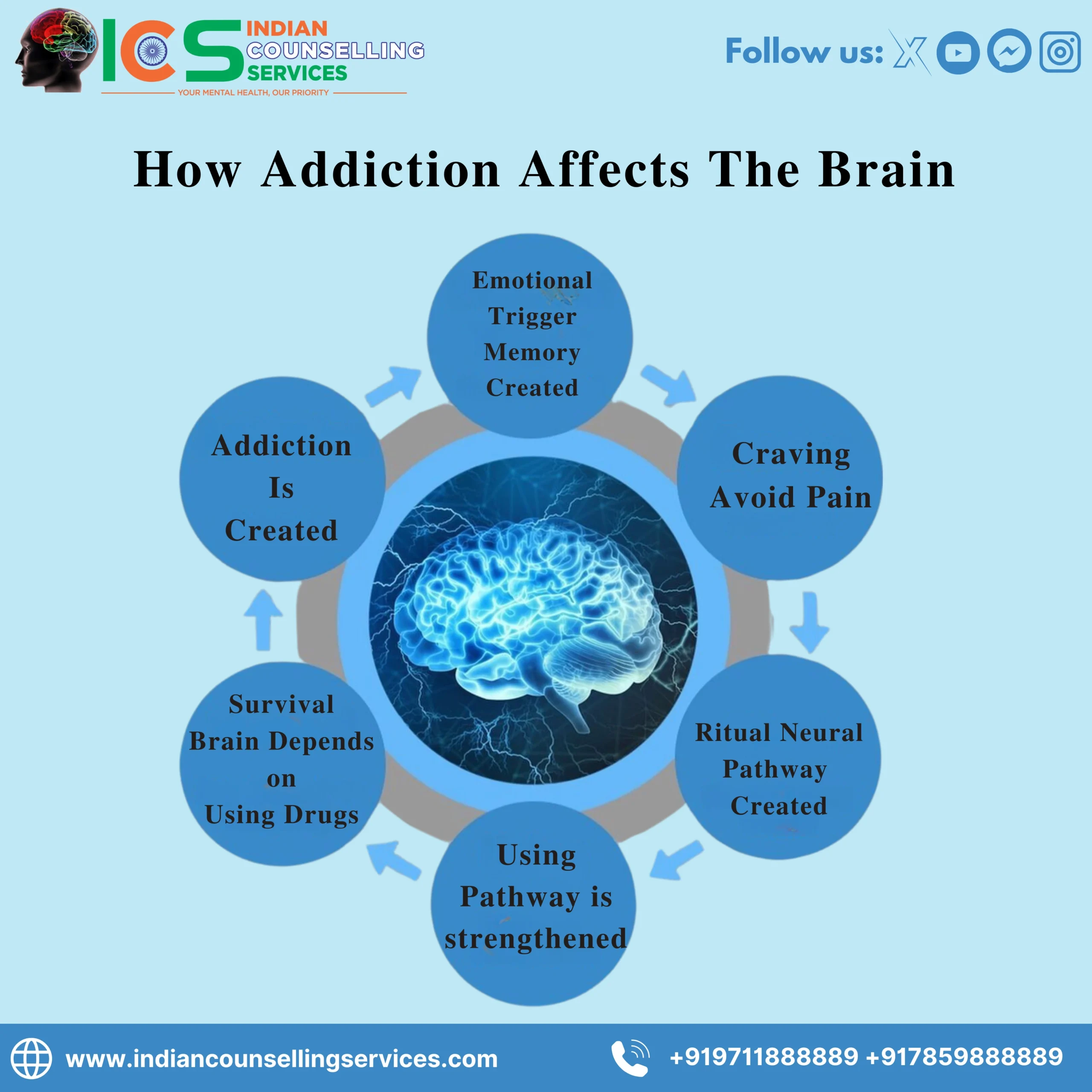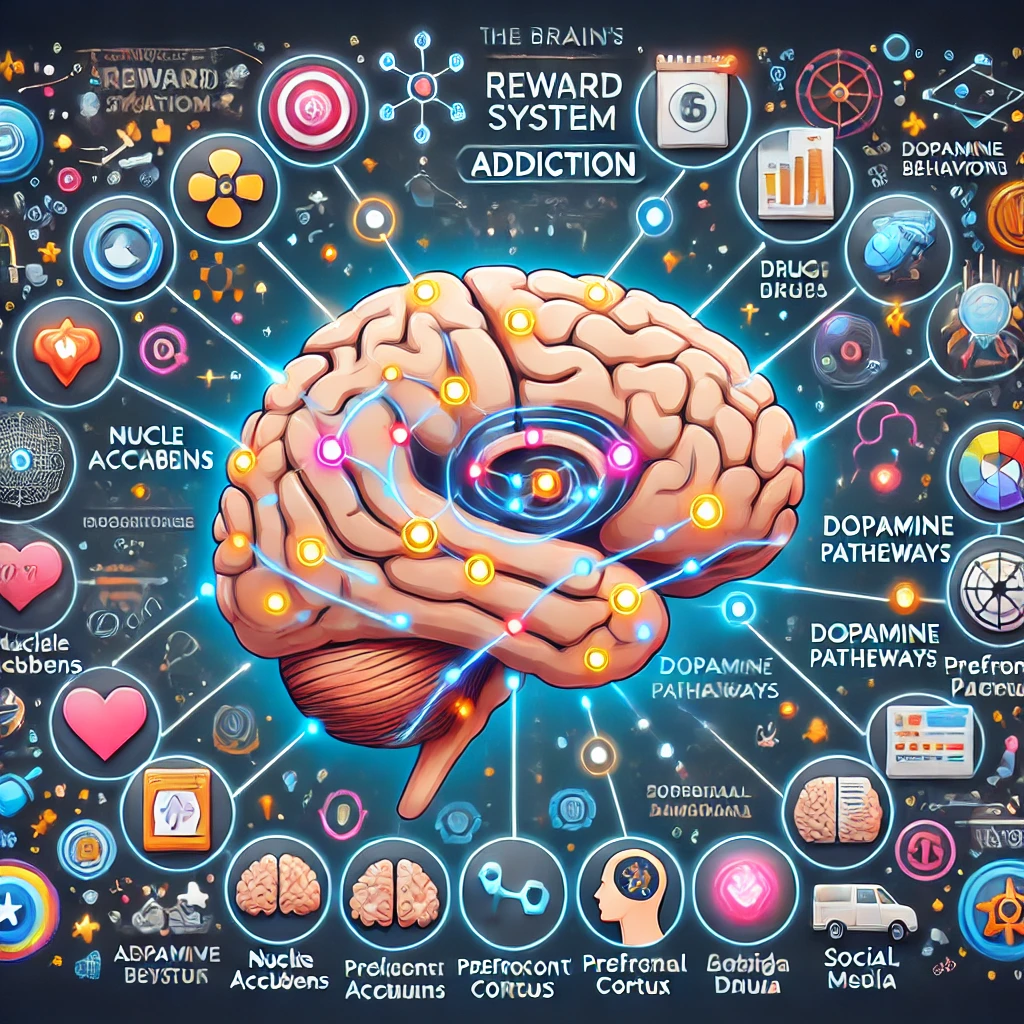
Rewiring the Mind: How Addiction Reshapes Brain Function
Addiction transcends being a matter of willpower or choice; it is a profound and intricate condition that reshapes the brain, altering its structure and functionality. From the first encounter with a substance or behavior to the grip of dependency, addiction fundamentally changes how the brain processes pleasure, stress, and decision-making. Recognizing these changes is key to addressing addiction—not as a moral failing but as a brain disorder that requires medical and psychological care.
Central to addiction is the brain’s reward system, a network of neurons and neurotransmitters designed to reinforce behaviors essential for survival, such as eating and reproduction. When engaging in these activities, the brain releases dopamine, a neurotransmitter that signals pleasure and reward. This mechanism ensures repetition of beneficial behaviors.
Substances such as drugs, alcohol, or even behaviors like gambling exploit this reward system. They trigger an excessive dopamine surge that surpasses what natural stimuli can produce. For instance, drugs like cocaine can elevate dopamine levels up to tenfold, creating an intense euphoria. This dopamine surge not only induces pleasure but also strengthens the association between the substance and positive feelings, laying the groundwork for addiction.

Over time, the brain adjusts to the heightened dopamine levels caused by addictive substances or behaviors. This adjustment, known as tolerance, involves reducing the number or sensitivity of dopamine receptors. Consequently, the same amount of the substance no longer produces the same pleasurable effect, prompting individuals to consume more to achieve the desired high.
Dependence soon follows tolerance. In this stage, the brain begins to rely on the substance to maintain normal functioning. Without it, dopamine levels plummet, leading to withdrawal symptoms such as anxiety, irritability, and depression. These symptoms often push individuals back to the addictive substance or behavior, sustaining the cycle of addiction.
Addiction’s impact extends beyond the reward system, disrupting other crucial brain regions:
1. The Prefrontal Cortex: Impaired Judgment
The prefrontal cortex, which governs decision-making, impulse control, and self-regulation, is significantly affected by addiction. Chronic substance use weakens this area, diminishing its ability to weigh risks and benefits. This impairment explains why individuals with addiction often make decisions that prioritize substance use over responsibilities or relationships.
2. The Amygdala and Stress Management
The amygdala, responsible for regulating emotions and the stress response, becomes hyperactive in addiction. This increased activity heightens sensitivity to stress and negative emotions, further reinforcing reliance on the substance as a coping mechanism.
3. The Hippocampus: Memory and Triggers
The hippocampus, involved in memory and learning, records the pleasurable experiences linked to substance use. These memories create powerful cravings and triggers, even after extended periods of abstinence, increasing the likelihood of relapse.
The changes addiction causes in the brain highlight its classification as a chronic condition. Similar to other chronic illnesses—such as diabetes or hypertension—addiction involves biological alterations requiring long-term management. These changes make it challenging for individuals to simply “quit,” as the brain’s rewiring often overrides rational decision-making and willpower.
The Influence of Genetics and Environment
Although anyone can develop an addiction, certain factors increase vulnerability. Genetics account for approximately 40-60% of a person’s risk, with specific genes influencing how individuals respond to substances or stress, making some more susceptible to addiction.
Environmental factors such as trauma, peer pressure, and socioeconomic conditions also play a role. Early exposure to substances or chronic stress can alter brain development, heightening the likelihood of addiction later in life.
Recovery and Neuroplasticity: The Brain’s Resilience
Despite the significant changes addiction imposes on the brain, recovery is achievable due to the brain’s neuroplasticity—its ability to adapt and rewire itself. Recovery often entails a combination of medical treatment, therapy, and lifestyle changes to restore brain functioning and cultivate healthier coping mechanisms.
Medications such as methadone, buprenorphine, and naltrexone can help stabilize brain chemistry, reduce cravings, and ease withdrawal symptoms. These treatments are most effective when combined with counseling and behavioral therapies.
2. Cognitive-Behavioral Therapy (CBT)
CBT assists individuals in identifying and altering negative thought patterns and behaviors associated with addiction. By addressing triggers and fostering healthier coping strategies, CBT supports sustained recovery and lowers the risk of relapse.
3. Mindfulness and Stress Management
Mindfulness practices, such as meditation and yoga, can help regulate the stress response and enhance emotional resilience. These practices have been shown to improve prefrontal cortex functioning, aiding better decision-making and impulse control.
4. Support Systems
Community programs like Alcoholics Anonymous (AA) or Narcotics Anonymous (NA) provide social support, accountability, and a sense of belonging, all of which are critical for recovery. Family therapy also plays a key role by addressing relationship dynamics and creating a supportive environment.
Preventing addiction requires proactive measures. Educating individuals, especially adolescents, about the risks of substance use is essential as their brains are still developing. Early intervention for those at risk can reduce the chances of addiction taking root. This includes addressing underlying mental health conditions, teaching coping skills, and fostering supportive environments.
The way addiction reshapes brain function underscores its complexity and the importance of addressing it as a medical condition rather than a moral failing. By understanding how addiction disrupts the brain’s reward system, decision-making processes, and stress response, we can develop more effective treatments and compassionate approaches to recovery. With appropriate support and interventions, the brain’s remarkable ability to heal offers hope for individuals striving to reclaim their lives from addiction.

1 Comment
먹튀검증
December 12, 2024Secure and recognized 먹튀스파이 공식 홈페이지 is imperative for online safety and avoiding scams. Well-established providers provide comprehensive solutions to help users gain better awareness. Choosing a proven source can reduce risks and enhance security, so always prioritize safety with verified information.